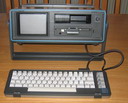Hi,
I have a SGI1100 and a SGI1200 server and I'm going to put a new OS on them. I guess a Linux distro would be best but there are so many to choose from.
There is Fedora Core 6 on the SGI1100 at the moment, but I want something more 'enterprise'
For those who don't know, these servers are Intel Pentium3 based.
I have found references to RedHat and SUSE here, they seem to work well on SGIs. There is also CentOS which should be very close to RHEL (but free) if I understand things correctly.
Maybe I should go with RHEL or SLES. They can be downloaded for free (I think) without support, which I don't want anyway.
It is good if there is support for Itanium, that I'm having in another computer, then I could put the 'same' distro on all Linux machines.
They won't be doing anything serious, just personal fileserver/webserver at most. Well the Itanium will hopefully run some graphics stuff to.
I just wanted to check the opinions in this forum.
I have a SGI1100 and a SGI1200 server and I'm going to put a new OS on them. I guess a Linux distro would be best but there are so many to choose from.
There is Fedora Core 6 on the SGI1100 at the moment, but I want something more 'enterprise'

For those who don't know, these servers are Intel Pentium3 based.
I have found references to RedHat and SUSE here, they seem to work well on SGIs. There is also CentOS which should be very close to RHEL (but free) if I understand things correctly.
Maybe I should go with RHEL or SLES. They can be downloaded for free (I think) without support, which I don't want anyway.
It is good if there is support for Itanium, that I'm having in another computer, then I could put the 'same' distro on all Linux machines.
They won't be doing anything serious, just personal fileserver/webserver at most. Well the Itanium will hopefully run some graphics stuff to.
I just wanted to check the opinions in this forum.










 (single-CM)
(single-CM)












 ...
...

 -
-



